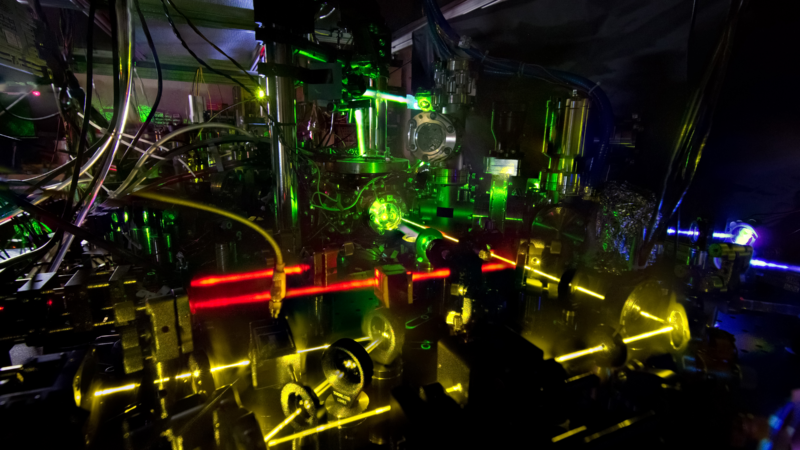Trump cuts threaten measurement lab critical for advanced chips and medical devices
The Trump administration is planning to close a small, obscure laboratory whose work undergirds everything from microchip manufacturing to nuclear fusion.
The Atomic Spectroscopy Group at the National Institute of Standards and Technology (NIST) provides the definitive measurements of atomic spectra. Spectra are specific sets of colors emitted by different atomic elements. Those sets of colors act as atomic fingerprints that are used to characterize a wide variety of things — from the gases in far-off stars, to the blood in a person’s finger.
The laboratory has been in continuous operation for more than 120 years, but in mid-April it will be forced to close, according to a letter sent by the lab’s head, Yuri Ralchenko, to dozens of colleagues around the world.
“We were recently informed that unless there is a major change in the Federal Government reorganization plans, the whole Atomic Spectroscopy Group will be laid off in a few weeks,” Ralchenko wrote in the letter, which was emailed on March 18 and seen by NPR. The letter was first reported by Wired.
Ralchenko says in the letter that he was told “our work is not considered to be statutorily essential for the NIST mission.”
But thousands of scientists and engineers disagree. A petition is now circulating to reverse the closure, and it has received close to 3,000 signatures as of Wednesday. Among the signatories is Nobel Prize-winning physicist Sheldon Glashow.
“I cannot believe that the government would be stupid enough” to slash this kind of work, Glashow said in a video statement.

Color Code
The overwhelming support exists because the group’s spectral measurements get used in almost every field imaginable, according to Elizabeth Goldschmidt, a physicist at the University of Illinois, Urbana-Champaign.
“You look at the very specific color of a star, it can tell you the makeup of the star. You look at the blood in someone’s finger … and that can tell you how much oxygen is in the blood,” she says.
But to measure colors accurately, devices like telescopes and pulse oximeters must be correctly calibrated, and that’s where the Atomic Spectroscopy Group comes in. The laboratory maintains a database of atomic spectra that are the standard reference used to ensure devices are functioning correctly. Every month, the database receives around 70,000 queries from around the world and is cited in at least two scientific papers, according to a recent post about it on NIST’s website.
In addition, the laboratory conducts precise measurements of ultraviolet atomic spectra that are critical to developing advanced microchips. Ultraviolet light is used to etch tiny circuits, and advances in the field require detailed knowledge of the atomic spectra of elements in the extreme ultraviolet. There are a handful of facilities that research ultraviolet spectra, and this group is one of them, Goldschmidt says. It also studies plasmas, which are ionized gases that enshroud nuclear fusion reactions. Researchers around the world are pursuing fusion as a clean and virtually limitless form of energy, and detailed knowledge of plasmas is essential to that development.
Neither NIST nor its parent agency, the Department of Commerce, responded to NPR’s enquiries about the closure, but the savings from closing the lab would be minimal. NIST’s annual budget is just $1.5 billion, less than 0.02 percent of the government’s $7 trillion annual budget.

Within NIST, the atomic spectroscopy group is made up of seven full-time federal employees. The group’s employees even pay out-of-pocket for coffee and sugar used in its coffee breaks, and have been doing so since 1973, according to a video celebrating its anniversary last year.
By contrast, if the spectroscopy group closes, the costs will be enormous, scientists say. Researchers around the world will waste hours on the Internet hunting around for the best spectral measurements, says Evgeny Stambulchik, a physicist at the Weizmann Institute of Science in Israel.
What currently takes a couple of minutes might soon take “many hours, maybe many days,” Stambulchik says. “Multiply that several hours by several thousands of scientists and you understand the waste of work time there would be without such a centralized database,” he says.
But Goldschmidt says the real blow would be to industry. Having centralized and agreed-upon calibration and measurement standards “is what allows industries to innovate and make new products,” she says. “Everyone wins when this happens at NIST because everyone can rely on what NIST does, and they don’t have to invest their time and money in doing it themselves.”
Rideshare union rights, social media limits and other state laws taking effect Jan. 1
Every new year, public media reporters across the country bring us some of the new state laws taking effect where they are. Here are six in 2026.
Guides to help you tackle your New Year’s resolutions
From building your strength to tackling credit card debt, NPR's Life Kit has a newsletter journey to help you tackle your New Year's resolution.
Guides to help you tackle your New Year’s resolutions
From building your strength to tackling credit card debt, NPR's Life Kit has a newsletter journey to help you tackle your New Year's resolution.
Dozens presumed dead in fire at Swiss Alps bar during New Year’s celebration
Dozens of people are presumed dead and about 100 injured, most of them seriously, following a fire at a Swiss Alps bar during a New Year's celebration, police said Thursday.
Warren Buffett officially retires as Berkshire Hathway’s CEO
The legendary 95-year-old investor spent decades building his company into one of the world's largest and most powerful. Now Greg Abel is taking it over.
Crypto soared in 2025 — and then crashed. Now what?
For most of 2025, cryptocurrencies such as bitcoin surged as President Trump vowed to make the U.S. a crypto leader. But now, a severe sell-off has shaken the sector.






